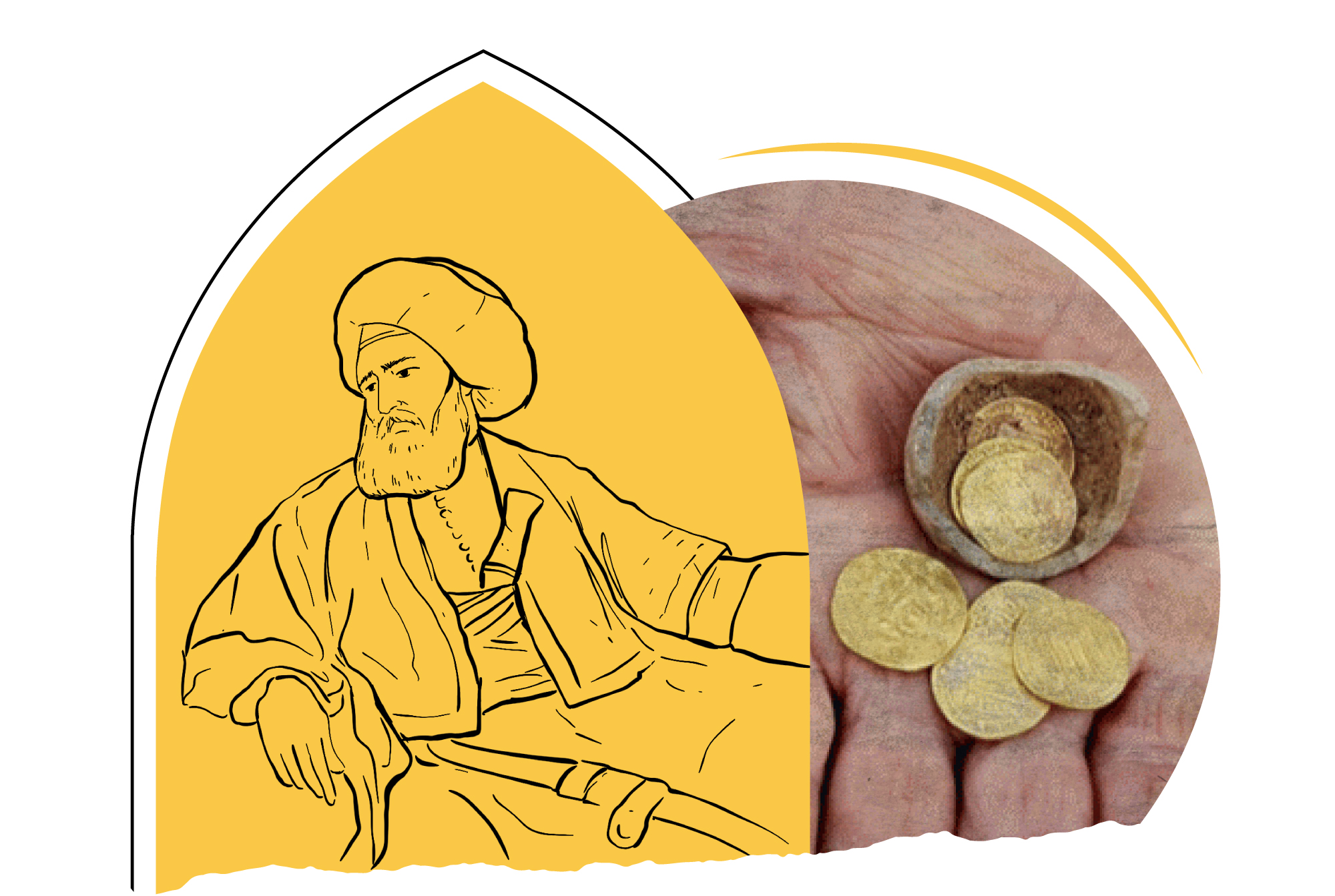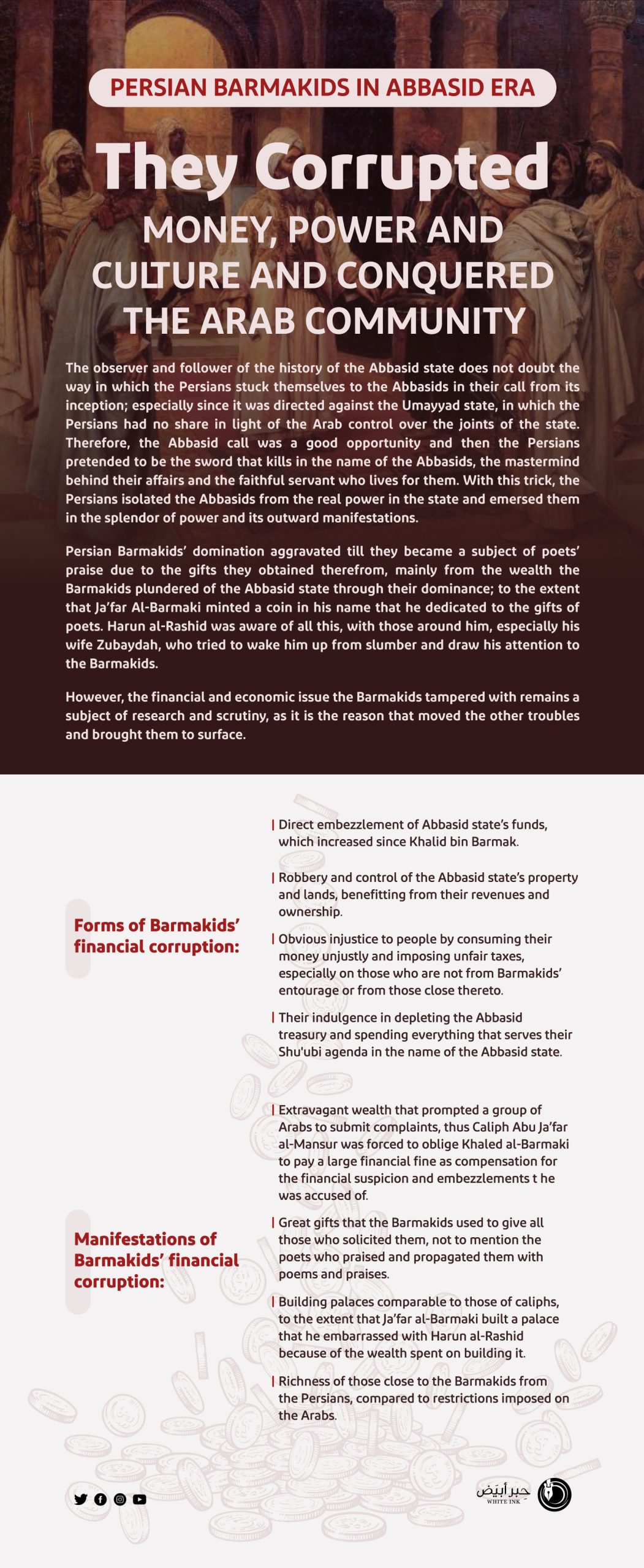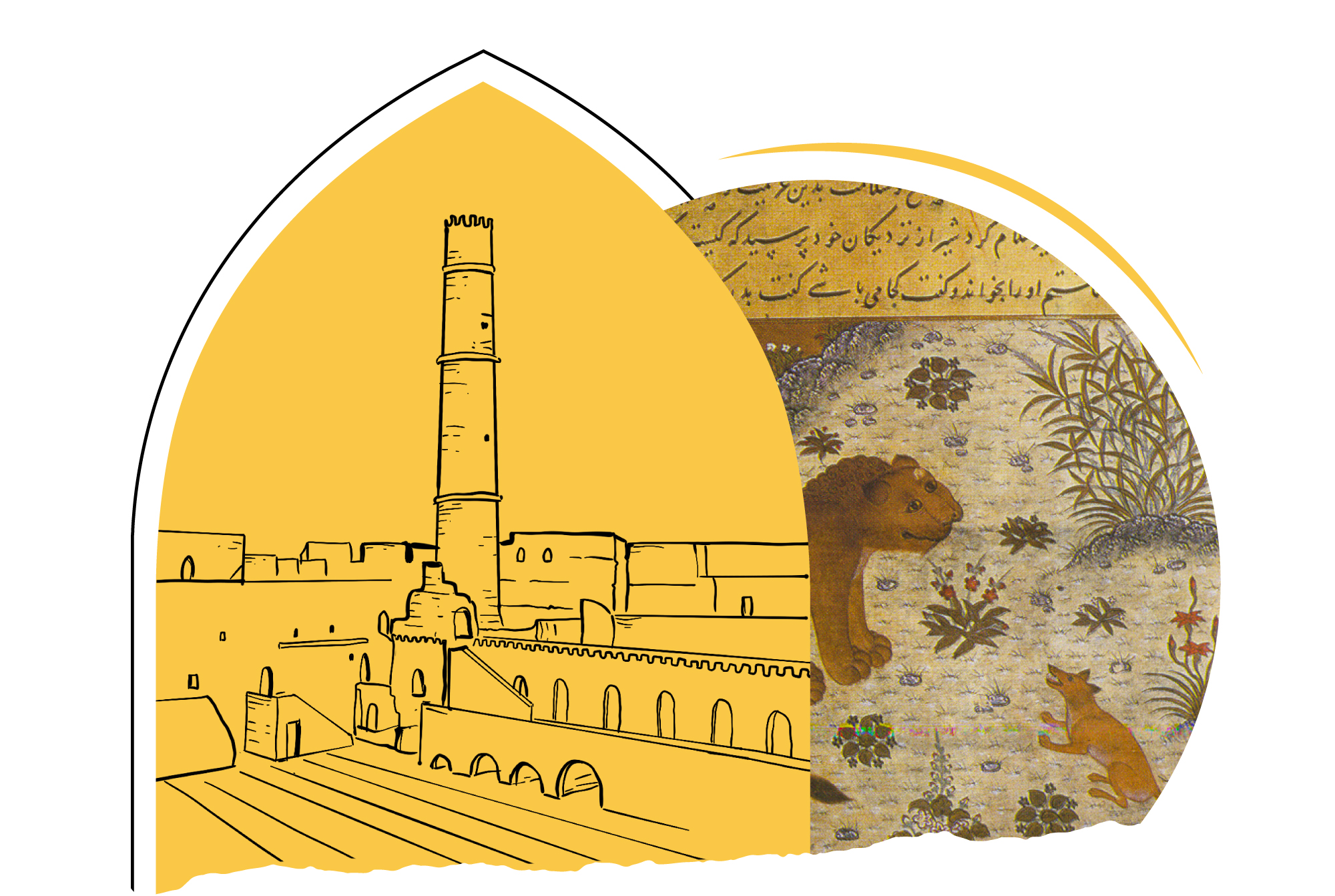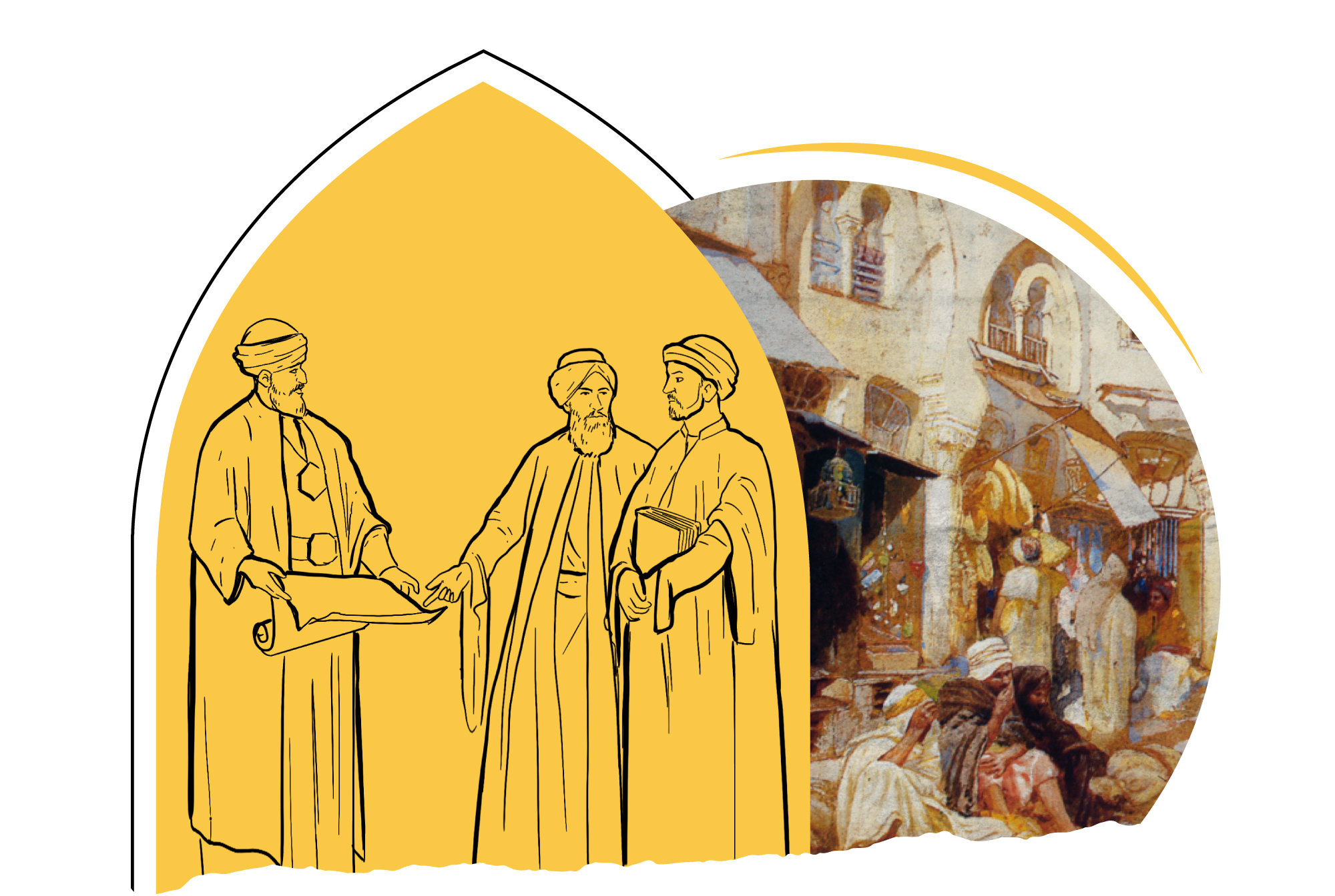
They tried to whitewash their fortunes with poets’ propaganda
Persian Barmakids’ Financial Corruption in Abbasid State’s Era
Some Persian families and personalities reached a prominent position in the era of the Abbasid state, with the support of the caliphs. From those families are the Barmakids. Their dramatic end was at the hands of Caliph Harun al-Rashid. The main problem of the Barmakids and the Persians who were influential in the Abbasid state was their attempt to support their Shu’ubi tendency by passing it on with their authority granted thereto by the Abbasid caliphs. Naturally, this tendency was supported by Persian historical legends, including that Barmak, the grandfather of the Barmakids, had converted to Islam, while the majority of historians confirm the opposite. However, the opposite direction was supported by his descendants who were influential in the Abbasid state.
One of the key matters that prompted Harun al-Rashid to overthrow the Barmakids was the personal relationship between Al-Rashid and Ja’far ibn Yahya Al-Barmaki, as well as the romantic look of Al-Barmaki to Al-Abbasa, Al-Rashid’s sister. However, there is another important reason, which may be the strongest and most prominent among all the reasons that historians dealt with about the Barmakid disaster, which is the Barmakids’ connection with the “Alawites”, who turned into enemies of the Abbasids for their ambition to the caliphate. Thar connection was due to the influential power that the Barmakids reached in the Abbasid caliph, so that some believed that the Abbasid state was run by two heads: the Abbasid caliph and a person from the Barmakids. This is what prompted Al-Rashid to reject that perception and its continuation.
Among the reasons that were discussed about the Baramkids’ disaster issue is the economic factor that historians consider to be one of the key reasons. In the beginnings of the Abbasid state, when the Abbasid call succeeded and the Abbasid caliphs came to power, they lacked administrative experience and did not have any supporters in administration and governance. The Abbasids refused to use the Arab element in administration, given the loyalty of the majority of Arabs to the Umayyad state. Here, the Persian role appeared in administration and governance, which culminated in the rise of the Barmakids.
Because Khaled Al-Barmaki took over the reins of administration after Abu Salama Al-Khalal crisis, he became a supervisor of land tax affairs and recording the proceeds therefrom in special records, in addition to other critical tasks; the most important of which is the management of the financial affairs of the Abbasid army. However, Khaled Al-Barmaki created an evil procedure that was followed by the Barmakids after him, which is not separating between state funds and their own money. Here the signs of sudden wealth appeared on Khaled Al-Barmaki, which was evident in the amount of subsidies and gifts he granted to some people.
Barmakids’ outrageous wealth outraged several Arabs, so they complained to the Caliph, Abi Ja’far Al-Mansur, who obliged Khalid to pay a large fine as a penalty for the embezzlement of state funds. However, the Barmakids were soon able to overcome this crisis and returned to administration and governance, especially with the rise of Yahya ibn Khalid al-Barmaki and his sons, al-Fadl and Ja’far. The increasing administrative influence of the Barmakids led to an unpalatable increase in their wealth and they had the upper hand in the financial affairs of the Abbasid state. Ahmed Amin summarizes this financial authority they had even over the affairs of the caliph’s palace himself, saying: “They put their hands on all the state’s funds, to the extent of their free disposal of anything, while Harun al-Rashid, and his palace, had to back to them whenever they wanted to take any action”.
When the fortunes they collected increased extravagantly, they wanted to protect them with “propaganda campaigns” to improve their image in front of “public opinion” and, at the same time, deter any attempt by their enemies to overthrow them, for fear of people’s revolution against them. At this point, the Barmakids were extravagant in giving gifts to poets, seeking to obtain their support, and several poems in praise of the Barmakids were written at that time. In this regard, it was said that Ja’far al-Barmaki ordered to mint a special gold coin with his name thereon and it was dedicated to the most prolific poets and the best of them in praising the virtues of the Barmakids.
Ja’far Al-Barmaki minted a coin in his name and dedicated it to poets praising him and his family.

That illicit enrichment was reflected in the aspects of the daily life of the Barmakids, including that Ja’far ibn Yahya built a new palace that costed twenty thousand dirhams. Ja’far advised some of his close associates that this might provoke Al-Rashid and those around him, prompt him to question the source of these funds and suspect that the funds were obtained from illegal operations by exploiting influence to embezzle state funds.
That illegal wealth and manifestations of luxury and extravagance in the Barmakid palaces were also attributed to Umm Ja’far al-Barmaki, after the Barmakid disaster, as “Um Ja’far was seen begging from a rich man on the day of Eid al-Adha, who asked her about her condition, and she said: “In a did like this day, I had four hundred maids (servants) and used to slaughter sacrifices and distribute meat. Today, I only have two furs, one to sleep on and the other to cover myself with. This is how days go!”.
Several complaints were also received at the gates of Al-Rashid about the misbehavior of the Baramkid officers in the tax collections assessment and the extent of corruption in that regard. There is no evidence for the violations of the Barmakids in public funds affair as what is stated in the introduction to the famous book “Al-Kharaj” by Abu Yusuf, in which he said: Harun al-Rashid knew of the transgressions that affected Islamic law in managing the financial bureaus and that he had no doubt that the Barmakids caused the largest part thereof”.
Here, Harun al-Rashid was no more satisfied with eliminating Ja’far al-Barmaki and imprisoning the rest of his family. He insisted on confiscating all their real estate and property. Al-Khudari stresses the importance of the economic factor and that the punishment of the Barmakids was due to their financial corruption and their misuse of the treasury. This is evidenced by the fact that Harun al-Rashid issued his order to pardon Muhammad ibn Khalid ibn Barmak, his son, his family and servants once he knew of his innocence from what other Barmakids committed.
Thus, it becomes clear that one of the most important causes of the Baramkids’ disaster was their corruption and abuse of the Muslims’ treasury.


- Ahmed Amin, Harun Al-Rashid (Cairo: Hindawi Foundation, 2014).
- Kouider Bashar, The Role of Baramkids in the History of the Abbasid State (Algeria: Institute of History, 1985 AD).
- Ali Al-Amr, Persians Political Impact in the First Abbasid Era (Cairo: Al-Degwi Press, 1979).
- Muhammad Barang, Baramkids in the Shadows of the Caliphs (Cairo: Dar Al-Maarif, n.d.)
- Muhammad Al-Khudari, Lectures on the History of Islamic Nations: The Abbasid State, edited by: Muhammad Al-Othmani (Beirut: Dar Al-Qalam, 1986).


From Khorasan to the Court of the Abbasid State
The Barmakids excluded the Arabs from the joints of the state and enabled the Persians
The Barmakids remain an exception in the Abbasid history as a Persian family that had a profound influence on the structure of the state, as it passed through the domination of the Abbasid rule and passed. However, the most prominent title in the Barmakid experience is that they were the result of a diligent Persian action that began from an early age and was active in penetration since the fall of the Umayyads, as the latter were not favored by the Persians. They considered them an extension of the Arab state that overthrew their Sasanian kingdom. Thus, they became an anti-Umayyad movement and they found in that an opportunity to draw closer to the Abbasids, work with them to overthrow the Umayyad rule, then penetrate the new state and rule through. That is how the Persian Barmakids were able to penetrate the Abbasid system of government, spread their political tricks in the palace, deepen the differences between the governors and the crown princes, bring the Persian element closer and expel the loyal Arabs.
The Barmakids acquired the only ladder to ascend to glory, wealth, status and influence, so the Arabs no longer had a way to develop and advance on the ladder of the Abbasid state except through the Barmakids; flattering them, getting close to them and submitting to their authority.
The actions of the Barmakids in the Abbasid state were not inconsistent with the Shu’ubi climate that dominated the joints of the state and its culture. Rather, most of their actions and practices were consistent with the Shu’ubi, anti-Arabism tendencies and entrenched hatred. Perhaps one of their most prominent actions in this regard is the revival of the foreign culture, celebrating Persian history and literature, encouraging the translation of Persian works into Arabic, and embracing translators and writers with Shu’ubi tendencies, especially from the Persians, with a view to elevate the status of Persian civilization. At the same time, they worked on degrading the status of the Arabs, their role and culture, by writing books denouncing them and ridiculing their customs and traditions.
Further, the Barmakids embraced poets with Shu’ubi tendency to promote for them and their culture among the people. They also worked very hard to shake the concepts of Islamic faith under the banner of freedom of opinion, gatherings of drinking and socialization, in addition to soliciting elements accused of heresy and atheism and carrying our secret activities of an ethnic nature through gatherings that only Persians could enter. Further to the above, they recruited Persians in all key positions in the state and had no problem showing their support to the Magi doctrine, which exposed them to accusation of heresy.
Barmaki planning began early to penetrate the Abbasid rule. Khalid bin Barmak laid the foundations for the relationship with the Abbasids and consolidated it with joining the Abbasid call against the Umayyad state. After the announcement of the establishment of the Abbasid state, the Barmakids began their first steps towards power and influence, as the name of Khalid ibn Barmak emerged from the first day of the pledge of allegiance to Abu al-Abbas al-Saffah for the caliphate. With his cunning and tact, he became close to the Caliph and favored thereby, who appointed him to critical positions in the state, until he was assigned the Ministry after the removal of Abu Salama al-Khalal.
A secret political movement such as the Barmaks movement cannot rise and increase its power and influence without the power of money. Therefore, they harnessed state funds to serve their purposes and spent generously on their followers, ignoring the interests of the state and the common people and their rights. They also worked to weaken the unity of the Abbasid state by causing discord and dissension among the sons of the caliph, in order to serve their ethnic interests
The Barmakids worked hard to exclude the Arabs from the palaces of the caliphs, accusing them of negligence in their actions and questioning their loyalty to the caliph, in order to gain his trust for themselves only and, hence, be able, to tamper with the state. This included all Arab leaders and thinkers who were suspected of being dangerous to them, i.e., everyone who did not serve their agenda and constituted a threat to their position in the heart of the Abbasid state.
They falsely played the role of the strong and trustworthy, infiltrated the palaces and controlled the sons of the caliphs.

Among the most prominent opponents of the Barmakids was Muhammad ibn al-Layth, who was famous for his non-inclination towards the foreigners and Persians, hence the Barmakids hated him and conspired against him, in addition to their endeavor with Harun al-Rashid to entrap military commander Yazid ibn Mazyad al-Shaibani, the performer of great achievements, who was well-reputed in the Abbasid state for courage and achievements. Yet, the Barmakids accused him of negligence in fighting the Kharijites.
Barmakids’ plans would not have been completed except by infiltrating the joints of the state and then seizing it by approaching the caliph and his sons, after which they used to stick themselves to the candidate for the caliphate later, to become his eyes, ears, and hands. Once their goal is attained, they excluded the Arabs and expanded the influence of the Persians and transformed the state into a Persian one with an Arabic title.
After the death of Caliph Abi Ja’far al-Mansur, the influence of the Barmakids expanded and dependence on them increased. In the year (161 AH), al-Mahdi ordered that Yahya ibn Khalid take over the affairs of his son Harun instead of his Minister Aban ibn Sadaqa. That was an opportunity to acquire the heart and mind of the young prince, especially that he was associated with them with breastfeeding brothers. Most importantly, they supervised his preparation for the future caliphate position, so as to ensure their continued influence and control.


- Ahmed Amin, Harun Al-Rashid (Cairo: Hindawi Foundation, 2014).
- Saleh Ramadan, Barmakids’ Shu’ubi Approach, Research Journal of the College of Basic Education, University of Mosul, p.4 (2010).
- Kouider Bashar, The Role of Baramkids in the History of the Abbasid State (Algeria: Institute of History, 1985 AD).
- Ali Al-Amr, Persians Political Impact in the First Abbasid Era (Cairo: Al-Degwi Press, 1979).
- Muhammad Barang, Baramkids in the Shadows of the Caliphs (Cairo: Dar Al-Maarif, n.d.)

Barmakids’ Tactic to Control the Reins of the Abbasid State
They infiltrated the convictions of the caliphs and busied them with manifestations of wealth, yet with no authority or power
The case of “Baramkid Ministers” is an important political phenomenon that was not analyzed and studied sufficiently, although it inspired a group of organizations that saw in approaching men of power is one of the prerequisites for controlling the inner affairs of ruling and the political decision-making system.
The Barmakids succeeded in climbing the ladder of power and owning the forefront of the Abbasid state’s economy, which enabled them to control the joints of power without arousing the wrath of the caliphs. Perhaps Harun al-Rashid was the first to notice the necessity of cutting them off because they reached what can be considered a “point of no return”. He said about that: “The Barmakids thought that the Hashemites are their slaves and that they are the state. They believed that they are the source of all Abbasids’ blessings”.
It can be said that the Barmakids were able to hold the key positions, from the position of the Minister of the state, which was held by Yahya al-Barmaki, to the position of commander of the army, which was entrusted to al-Fadl ibn Yahya, reaching to Ja’far ibn Yahya, who assumed a group of political and military positions. This is in addition to their monopoly on agricultural lands and large estates, until they thought that they were the true owners of the state and acted on that basis.
In this context, we believe that the Barmakid disaster began when they underestimated the intelligence and cunning of Harun al-Rashid and believed that he was unable to move and maneuver without them, and that they controlled the political and military backbone of the state. This was expressed by Ja’far ibn Yahya in his response to Ismail ibn Yahya al-Hashemi, when he said: “O Ismail, I swear that your cousin has eaten bread only by my grace and this state is established only by us… and I am planning for great matters until he extends his eyes to see what I stored up and selected for my son and my successors thereafter, with Bani Hashim’s envy inside him, along with their oppression and greed. I swear, if he asked me any of this, he will be gravely misfortune”.
They underestimated Al-Rashid's cunning and political sophistication, so they dared and defied him and the Arabs.

Harun al-Rashid contributed to tightening the screws on himself and his rule when he empowered the Barmakids. He decided to keep the manifestations of power and not its essence, so he empowered and “entrusted Yahya al-Barmaki with powers and authorities, as well as his children. He threw himself into their arms politically, economically and administratively and almost removed himself from all state affairs”. On their part, the Barmakids forgot or tended to forget that the positions and influence they reached was due to their affiliation to the Abbasid state, which they ruled in its name and rose through their affiliation therewith. They forgot the fate of those who preceded them, though Abu Muslim Khorasani’s disaster was not far from them.
“The Sultan is sterile”. That is the point the Barmakids did not pay attention to despite the shrewdness of Yahya al-Barmaki, who knew that they had no authority except under the Abbasid state, otherwise the people would revolt against them. Therefore, the Barmakids saw the necessity of preserving a mimic caliph who “prevails yet does not rule”, which was not acceptable to al-Rashid, who was well versed in government and politics affairs.
If underestimating the personality of Harun al-Rashid contributed to the beginning of resenting the Barmakids, yet provoking his wife, Zubaydah, and restricting her expenses has hastened the elimination of their existence, especially as she was proud of her lineage and her affiliation to Ja’far ibn al-Mansur. As Yahya al-Barmaki rose to the highest positions of power thanks to the recommendation of al-Khazayruz, the mother of the Caliph, the beginning of the disaster was by the hands of Zubaydah, wife of al-Rashid.
In fact, Harun al-Rashid did not stand idly. He moved first to control the affairs of the palace through his minister, Ibn al-Rabee, in addition to planting spies that owed him personal loyalty. This is in addition to the movements of Zubaydah who mobilized Bani Hashem against them. These attempts succeeded in sorting out the loyalists of the state and the followers of the Barmakids. The arrogance of Yahya al-Baramaki contributed to the discontent of all those who did not benefit from the “Baramka tips”. especially among the Arabs who resented and considered them “intrusive in the affairs of the state”.
In sum, it can be said that the Barmakids dug their graves with their own hands when they believed that they were the owners of the state, controlling all its strings, which prompted Harun al-Rashid to wake up from his prolonged political coma in which he gave the Barmakids a preference that they were not worthy of. The moment came when Al-Rashid woke up to “his religion, Arabism and nation, only to find them all in danger. He then resorted to tricks until he, his family, nationality, Arabism, religion and language got rid of those evil eagles that almost killed him”.


- Ahmed Amin, Harun Al-Rashid (Cairo: Hindawi Foundation, 2014).
- Saleh Ramadan, Barmakids’ Shu’ubi Approach, Research Journal of the College of Basic Education, University of Mosul, p.4 (2010).
- Kouider Bashar, The Role of Baramkids in the History of the Abbasid State (Algeria: Institute of History, 1985 AD).
- Ali Al-Amr, Persians Political Impact in the First Abbasid Era (Cairo: Al-Degwi Press, 1979).
- Muhammad Diab Al-Atlidi, Informing the People of What Happened to the Barmakids with Bani Al-Abbas (Beirut: Dar Sader, 1990).
- Muhammad Barang, Baramkids in the Shadows of the Caliphs (Cairo: Dar Al-Maarif, n.d.)





